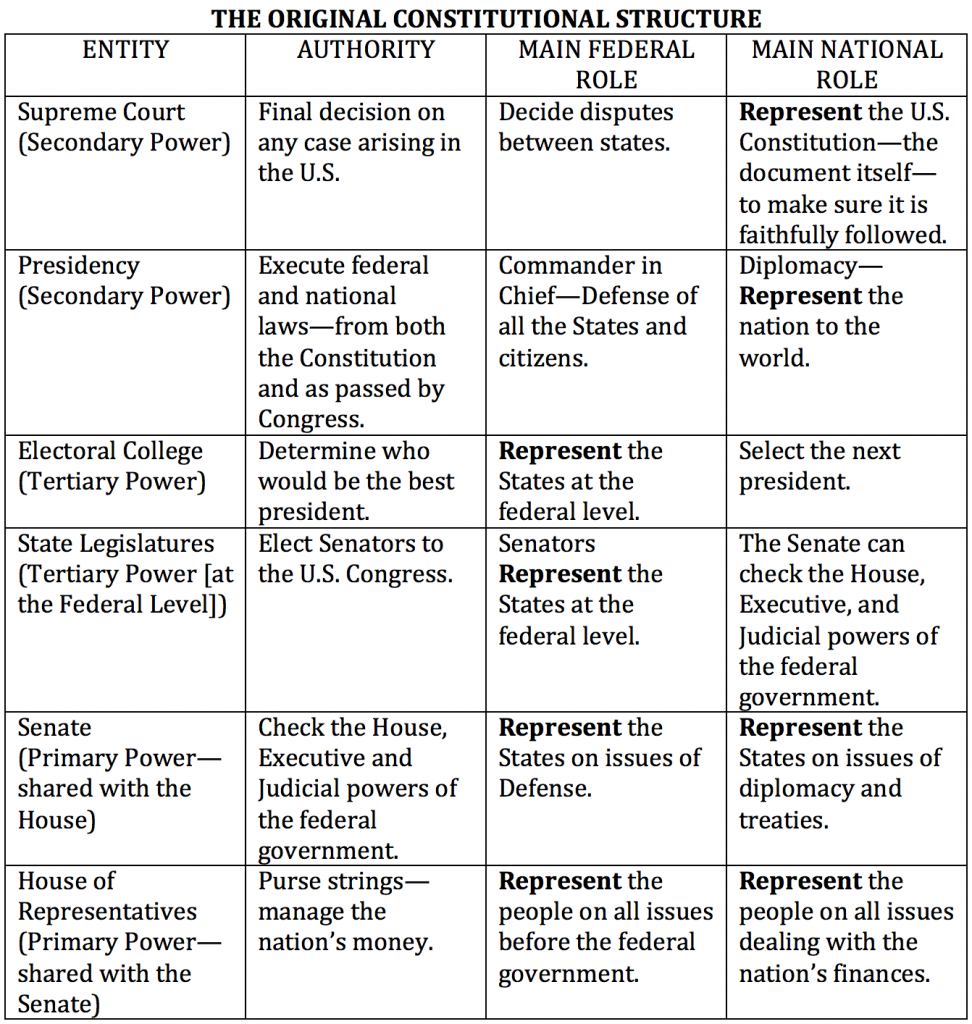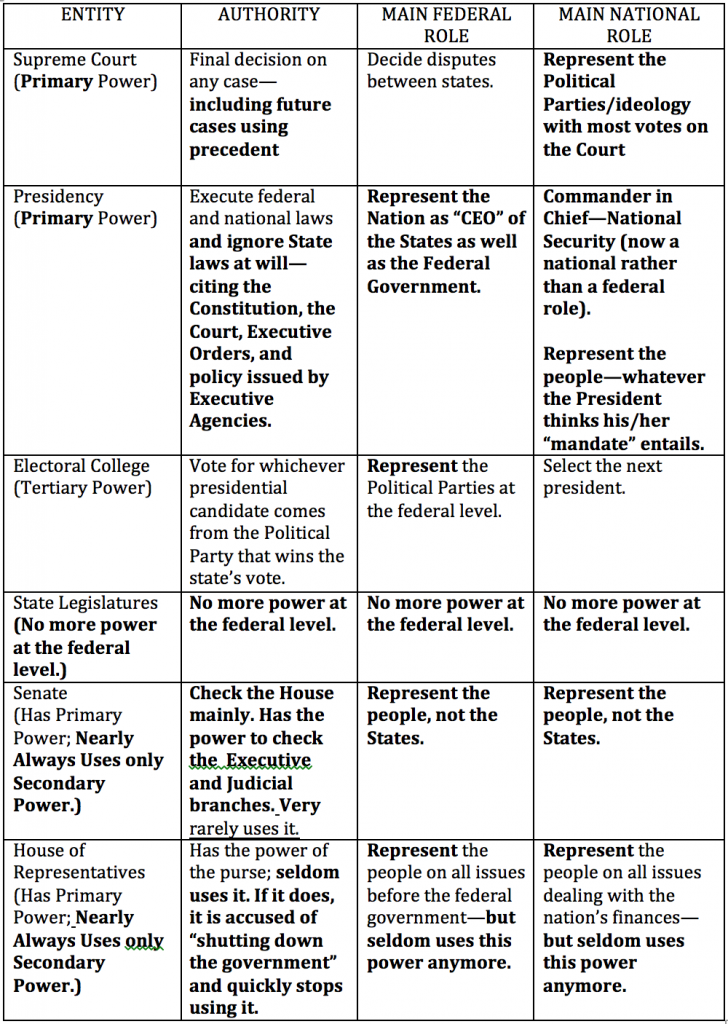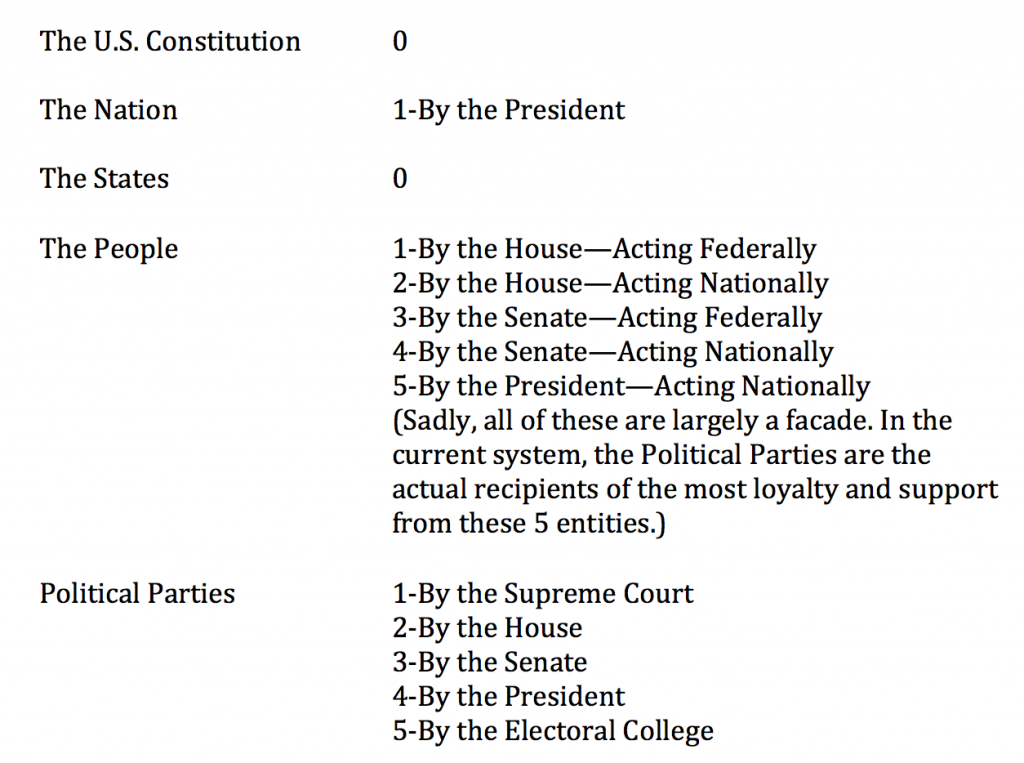“Attack Business, as Usual”
November 2nd, 2016 // 6:58 am @ Oliver DeMille
Washington’s Current Slump
(And the Solution)
Growing or Shrinking?
 To pay for the national debt, including the unfunded mandates and entitlements ahead, “Uncle Sam needs more than $429,108.73 per person.”[i] To figure out how this directly impacts you, just write down how much you make a year—and multiply it by the number of years you plan to keep working. (Not a perfectly precise approach, but it will get us in the ballpark.) Then multiply $429,108 by the number of people in your family. Find the difference between the two numbers, and that’s how taxes will impact you in the years ahead.
To pay for the national debt, including the unfunded mandates and entitlements ahead, “Uncle Sam needs more than $429,108.73 per person.”[i] To figure out how this directly impacts you, just write down how much you make a year—and multiply it by the number of years you plan to keep working. (Not a perfectly precise approach, but it will get us in the ballpark.) Then multiply $429,108 by the number of people in your family. Find the difference between the two numbers, and that’s how taxes will impact you in the years ahead.
For many Americans, the taxes in this reality are higher than the total amount of money they’ll make. Which is why politicians want to take most of it from the rich. But when they do, the wealthy find ways to move their businesses and savings abroad or into other financial vehicles—hurting jobs, investment, and making the economic struggles of average Americans even more difficult.
However we slice this, it’s a massive problem. It is already hurting almost all Americans (as seen in the Great Recession beginning in 2008, and growing ever since). Government stimulus, printing of inflationary money, and low gas prices have dampened how deeply we feel this problem right now—but these aren’t going to last forever. At some point the bubble will burst, and the economy is in for a tough time. All of us will be directly impacted.
But Washington hardly seems to notice. During elections most candidates promise real change, but it seldom materializes, at least not in positive ways. In fact, since 2008 we’ve seen a stubbornly sluggish economy. Washington puts out positive statistics each month, but most people aren’t feeling any kind of economic boom. And 90 days later Washington revises its past statistics—they are routinely much worse than originally announced.
Yet for some reason, the initial positive announcements make big headlines, while the revisions are usually buried in fine print. It’s almost as if the mainstream media is trying very hard to make the current Administration look as good as possible, and sway the election in their favor as well.
Safe and Secure
It may also be that Washington actually doesn’t notice how hard this economy is for most Americans. As “Phillip Longman recently noted in the Washington Monthly, the per capita income of Washington, D.C. in 1980 was 29 percent above the average for Americans as a whole; in 2013 that figure was 68 percent.”[ii] That’s 68 percent more! To put this in concrete terms, a person making $15 per hour would be compared to a person making $25 per hour. Or compare a person making $4000 per month to the 68% increase: $6720. Is it any wonder that Washington doesn’t feel the pinch quite so much as Joe American?
Compared to average Americans, Washington is doing a lot better. So why would they worry? For many in the nation’s capital, it must feel like time to fiddle, not worry that Rome is burning. Imagine how you’d be doing with 68 percent more money each month. (68% more of any amount seems fantastic. I’d be fiddling, too.)
Along with the struggling economy—largely a result of Washington’s increasing mountain of red tape that is choking American businesses—the U.S. is continuing to spend a lot of money on national security programs that aren’t working. “Since 9/11,” an investigation in The Atlantic reported, “the United States has spent $1 trillion to protect the homeland. The new security state is vast—and growing.” But “are we any safer?”[iii]
The experts answer that yes, we are a bit safer in some ways.[iv] But not even close to $1 trillion worth—and besides, we are less safe in a number of other ways.[v] Less safe, in fact, than we were when Bush won his second term or Obama was elected the first and second times. Specifically, Al-Qaeda and the Taliban are still around, Iraq is a mess, ISIS is growing, our privacy is dwindling (along with our spending power), and the threats from places like Russia, China, North Korea and Iran have actually increased, along with the growing dangers of cyber and other non-traditional attacks (chemical, biological, lone wolf, dirty bomb, etc.).
It seems the more we spend, the more vulnerable we are. Our lack of a coherent and widely-supported national grand strategy has made things significantly worse over the past decade.
As if this weren’t enough, we are also now facing a growing threat of serious economic conflict with China, which is buying up contracts and supply chains for natural resources around the world. Unlike U.S. firms that work largely on their own capital or that borrowed from banks or investors, all governed by boards and shareholders, Chinese firms are managed by a central government approach—even more controlling than British mercantilism in the 18th and 19th centuries.
Circling Closer
We’re right not to follow the Chinese model, since central controls undermine freedom. But the differences between our system and theirs skew the way economic statistics are reported, meaning that few Americans realize how bad our economic outlook really is. For example, in the latest Fortune 100 rankings of the biggest businesses in the world, the U.S. has 38 companies on the list, all of which are private.[vi] In contrast, China has 18 companies on the list; 16 of these are owned by the government.[vii] Combine the totals of these 16 businesses, and the Chinese government owns by far the biggest business in the world.[viii] Nobody else is even close.
Here’s another way to look at this: of the biggest 5 businesses in the world, one (Walmart) is a U.S. company and the next three are Chinese—all owned by the government in Beijing.[ix] The combined revenues of these three Chinese businesses are double that of Walmart, and over three times the revenue of the fifth biggest company in the world, Royal Dutch Shell oil.[x]
In comparison, Europe is home to 29 of the biggest 100 businesses in the world, 28 of which are private, while 1 is owned by the government of France.[xi] Furthermore, Japan, South Korea, Taiwan and Singapore are home to a total of 11 of the 100, and all are privately owned.[xii] Together Russia, Brazil and Mexico are home to 4 of the world’s largest 100 businesses; 1 (in Russia) is private and the other 3 are government owned (one from each of these nations on the last list).[xiii]
In short, of the world’s biggest 100 businesses and largest producers of global wealth and prosperity, 20 are owned by a government, 16 of them by one single government: China. Yet Washington keeps hobbling American entrepreneurs and investors with increasing regulations that stifle our ability to compete. Yes, China’s economy has slowed a bit this year, but their growth is still way ahead of the United States—and their slowdown will likely mean they’re less willing to keep carrying our debt load (very bad news for our economy).
It’s time for Washington to take note of our gloomy economic outlook, addiction to government overspending and growing debt, and a very expensive and bureaucratic national security apparatus that is more hat than cattle—as the saying goes in Texas. For this vitally important change to happen, we’ve got to stop expecting so much from the White House and demand a lot more from Congress. Until this occurs, we will keep declining in an “attack business, as usual” approach to the economy.
Forward or Back
All this that I have described here is a recipe for major American decline. And it is our current path.
With all that said, I’m an optimist. I believe the best years for America and the world are still ahead. But how soon we initiate those “better years” largely depends on the Congressional elections in 2016. We need a Congress that will finally stand up for the American people (against the executive and judicial branches) and get serious about creating a truly free, booming economy.
We haven’t had such a Congress for decades—and we’ve been in decline ever since that trend started. Such forces of decline are now snowballing, meaning that the actions of the next Congress will largely determine America’s trajectory for the 21st century.
[i] Harry S. Dent, Boom & Bust, July 2016
[ii] Cited in The Atlantic, September 2016, p. 102
[iii] Steven Brill, “Are We Any Safer?” The Atlantic, September 2016
[iv] Ibid.
[v] See ibid.
[vi] See Fortune, August 1, 2016, 110-119
[vii] Ibid.
[viii] Ibid.
[ix] Ibid.
[x] Ibid.
[xi] Ibid.
[xii] Ibid.
[xiii] Ibid.
Category : Aristocracy &Blog &Business &Citizenship &Community &Culture &Current Events &Economics &Entrepreneurship &Featured &Foreign Affairs &Generations &Government &History &Independents &Leadership &Liberty &Mission &Politics &Producers &Prosperity &Statesmanship &Technology
THE REAL BATTLE OF OUR TIMES
October 26th, 2016 // 6:40 am @ Oliver DeMille
And the Real Need in the 2016 Election
Vital Point #1
 We need a Congress that will finally stand up for the American people and get serious about adopting policies that bring a more genuinely free—and therefore booming—economy.
We need a Congress that will finally stand up for the American people and get serious about adopting policies that bring a more genuinely free—and therefore booming—economy.
While the mainstream media focuses on the presidential election, the real battle will be for Congress. Even some members of Congress argue that winning the White House for their party will make all the difference—but that’s only true if the next Congress remains weakly afraid to take on the Oval Office and use the power of the purse to put our economy back on track. The American framers set up the Constitution with exactly this in mind: a strong Congress that keeps the president in check.
Many people consider this election one of the most important of our generation. And it is, but not because of the presidential contest. Put simply:
Regardless of who wins the White House this year, the real issue will be whether we have a weak Congress who lets the executive branch keep increasing spending and decreasing freedoms—or a strong Congress that understands what the Framers intended and uses their Constitutional powers to get our economy back to true free enterprise.
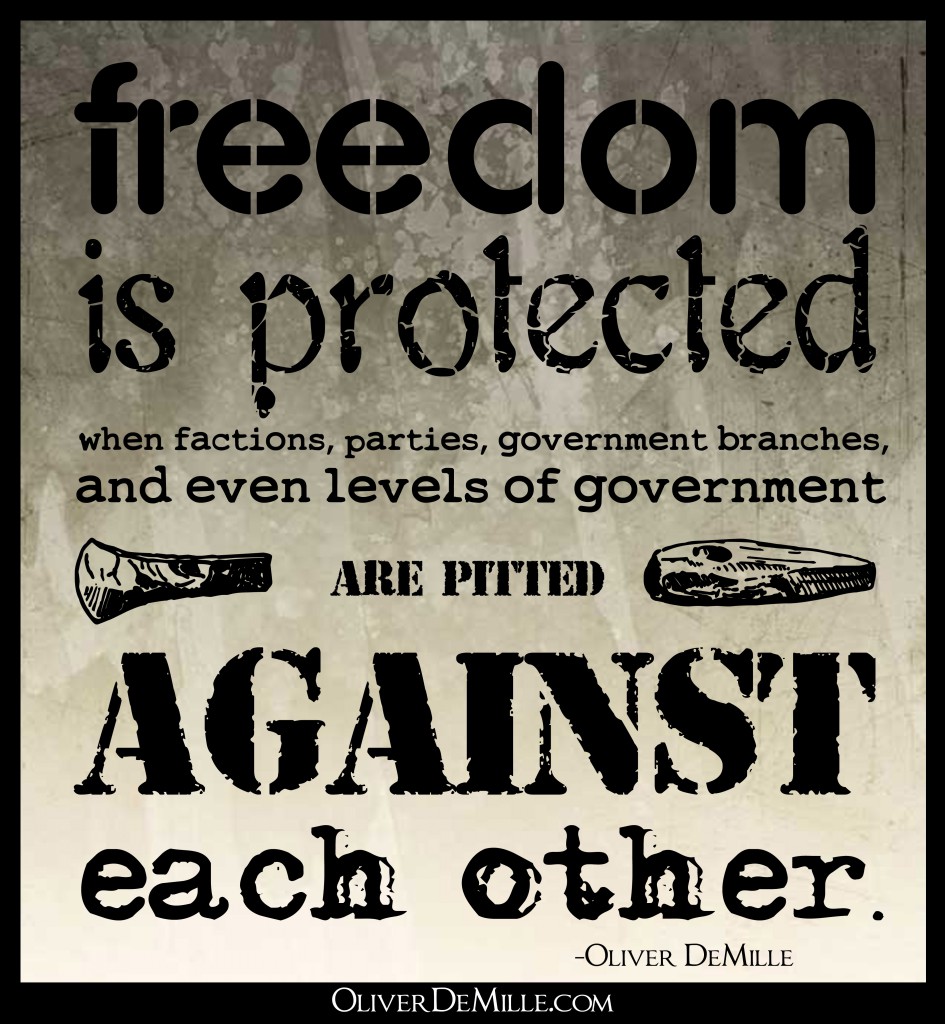 No matter who becomes president, this one issue will determine our future.
No matter who becomes president, this one issue will determine our future.
The voters need to understand this, and keep their eye on the ball. This is extremely important.
The two things the next president will do that are near this level of importance are 1) to appoint new members of the Supreme Court, and, 2) heaven forbid, to deal with a major national security problem. So, obviously, the executive election matters as well. But without the right Congress, we’re in for major decline in the coming years—no matter who occupies the Oval Office.
Vital Point #2
The real battle isn’t what most people think. It is being waged in both subtle and open ways, but academia and media seldom mention it directly. Yet this battle will determine our future.
Many think the great battle of our times is one of the following:
- Socialism vs. Capitalism
- International Interventionism vs. America First
- China vs. the United States
- Conservatives vs. Liberals
- Globalism vs. Nationalism
None of these is even close to our biggest challenge. Today’s great war for our future is much larger, significantly deeper, and more impactful than any of these. The great battle of our times is:
Elitism vs. Enterprise
More specifically: Top-Down Elitism vs. Grassroots Free Enterprise. Note that elitism thrives when a few super-rich at the top dominate finance, politics, media, and culture in our society. Enterprise flourishes where the regular people—the masses—have great economic opportunity and as a group determine our economy, government, and social customs/values.
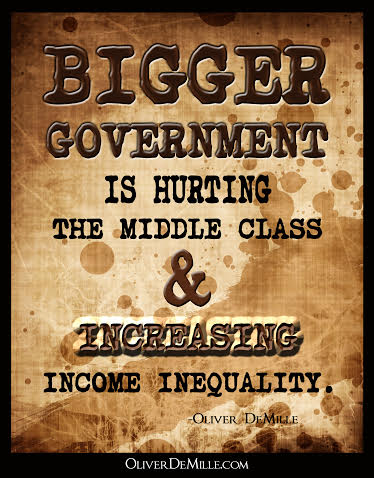 Elitism rules from a few top banks, governmental institutions, exclusive universities, elite media firms, and dominant corporations. Enterprise drives society from the basis of strong families, communities, churches, voluntary service organizations, and small businesses.
Elitism rules from a few top banks, governmental institutions, exclusive universities, elite media firms, and dominant corporations. Enterprise drives society from the basis of strong families, communities, churches, voluntary service organizations, and small businesses.
But there’s more: Elitism today dominates the top organizations promoting both socialism and capitalism, and it makes up the Establishment of both major political parties. Elitist banks and corporate leaders control the management of those seeking both globalism and national strength. The leading media and academic hawks and doves are nearly all elitists. Elites win by controlling both sides of things—wherever they can.
Elitist investment rules the corporate world, top media providers, and the most powerful special interest groups. Elitist philanthropy controls higher education, the most influential think tanks, and many of the most powerful foundations (most of which operate quietly behind the scenes).
In America, the word Enterprise is frequently coupled with its partner, freedom, in the phrase “Free Enterprise”; but “Free Elitism” is an oxymoron. If it’s truly free, it isn’t elitist.
Indeed, it is elitist influence in Congress and the media that circumvents the Constitution by convincing the House not to utilize its power of the purse to check the White House, the Court, or the Senate. So, yes, the real need in this election is to elect the right Congress—men and women who will use the Constitution as intended.
Action Plan
But the real war runs much deeper: Getting regular people to choose enterprise over elitism, in their votes for Congress and in their everyday education, career and cultural choices as well. This war—to awaken the people to the reality of top-down ruling elitism vs. grassroots free enterprise, and get them to take a stand for free enterprise—is the great battle of our times.
This starts with the most basic principles of learning and livelihood. On an educational level: If you’re not regularly reading the great books, great classics, and great ideas, you’re part of the problem. Concerning career: If you’re not engaging or strongly supporting entrepreneurial ventures, or (at the very barest minimum), encouraging entrepreneurialism among the youth, you’re part of the problem.
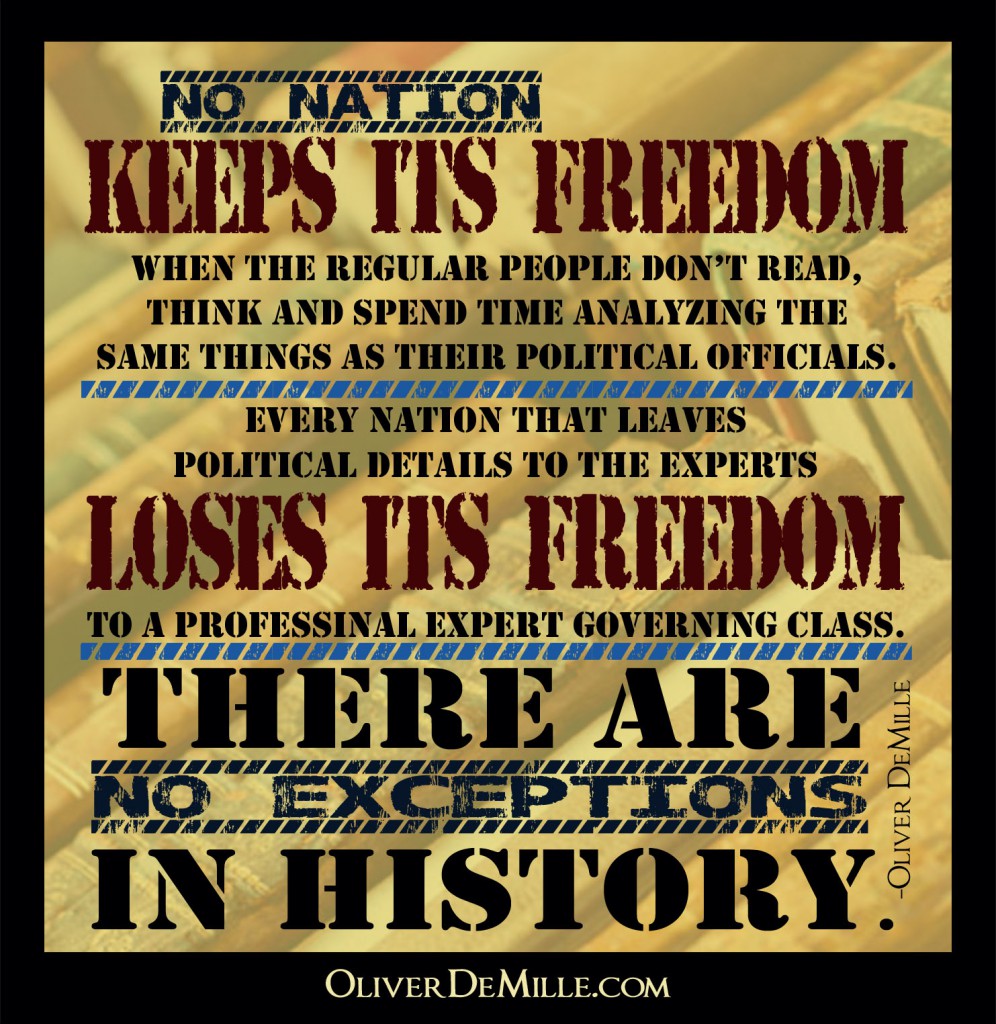 If you’re swayed by the education/career conveyor belt, or pushing your children and grandchildren into it, you’re part of the problem. If you’re swayed by the elitist Establishment that dominates both political parties, or their media partners, you’re part of the problem. And if you’re caught in the socialist vs. capitalist or national versus globalist debates (all of which are ultimately led by elitists), you’re part of the problem.
If you’re swayed by the education/career conveyor belt, or pushing your children and grandchildren into it, you’re part of the problem. If you’re swayed by the elitist Establishment that dominates both political parties, or their media partners, you’re part of the problem. And if you’re caught in the socialist vs. capitalist or national versus globalist debates (all of which are ultimately led by elitists), you’re part of the problem.
Elitism wins as long as the masses play the elitist’s game. Indeed, many people are actually supporting elitism, either by giving up on their dreams and simply settling for whatever job pays the bills, or by trying to climb the elite ladder and become part of the elite themselves (and/or guiding their children toward the same).
The solution is enterprise. What is your mini-factory, your enterprising project (or projects) that fuels your passion and have the potential to greatly improve the world? If you don’t have such a mini-factory—or find yourself seldom working on it—you aren’t fighting the great battle of our time. And our side is losing.
This battle is real. Current. Dramatic.
It is happening right now.
We need to win it for freedom, for our children and grandchildren, for the future of families and morality and goodness. Which means this: We need your involvement.
Right now.
(To learn more about creating your own personal mini-factory, and how this will win the battle of our times, read The Coming Aristocracy by Oliver DeMille. Available at the Leadership Education Store)
Category : Aristocracy &Blog &Business &Citizenship &Community &Constitution &Culture &Current Events &Economics &Education &Entrepreneurship &Family &Featured &Foreign Affairs &Generations &Government &History &Leadership &Liberty &Mini-Factories &Mission &Politics &Producers &Statesmanship
How the Election Really Works
August 31st, 2016 // 1:24 pm @ Oliver DeMille
“Sometimes the wicked man undergoes a change for the better,
but the fool never does.” —Anatole France
Seen and Unseen
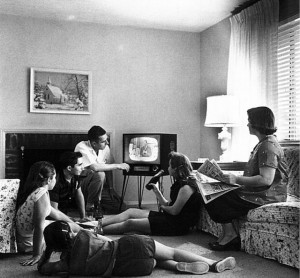 They’ve become part of our cultural “truth”. Yet both are myths. Lies, in fact:
They’ve become part of our cultural “truth”. Yet both are myths. Lies, in fact:
“Perception is reality.”
“It’s just business.”
Indeed, these two popular sayings are usually voiced precisely to justify doing something wrong. Or mean-spirited. Or both. The truth is that reality is reality; perception seldom is—especially in the age of modern media. And “business” is never a valid excuse for being unprincipled, no matter what the media tries to tell us.
For example, in the 2016 movie remake of Tarzan, the bad guy (a social-climbing bureaucrat whose role is to represent his European king in Africa) kidnaps John Greystoke’s wife Jane, tries to “seduce” her through manipulation and threats, and kills those who try to defend her. Then he sets out to sell her to Greystoke’s enemies. Not a nice man.
Perhaps the most poignant scene in the movie comes after a dinner where Jane refuses his advances and then leaves the room. Once she has departed, the kidnapper notices that her silverware isn’t properly placed on the plate—so he quickly remedies the situation, showing that he has the perfect table manners of the European royalty.
The irony couldn’t be more striking. Such perfect table manners in a man who is a slaver, murderer, thief, racist, and would-be rapist. He has all the appearances of nobility, but no actual nobility. Perception and reality are, in his case, polar opposites. He is the worst kind of degenerate—the kind who hides his decadence behind carefully polished surface appearances. He is Iago. Wickham. Tartuffe.
In this man’s case, perception is the opposite of reality. And to him the phrase “it’s just business” means corruption and debauchery are not only acceptable, but preferable—and routine.
Love and Freedom
The French playwright Moliere (“France’s Shakespeare,” as some literary experts argue) captured this all-to-human flaw in his most famous play, Tartuffe. This classic contains an important warning for today: The way most people gullibly accept the influences of media in modern life is a serious problem.
If any institution sets out to make perception seem like reality, and to justify all manner of questionable things in the name of “it’s just business”, it is modern media. From aggressive paparazzi stalkers to “gotcha” bullying in the name of investigative reporting, to exposés and even seemingly credible reporting that play to an agenda, in spite of available evidence – today’s media has, in large part, abandoned its role as the conscience and “watchdog” of society and become part of the bigger problem. Indeed, much of media is a contemporary Iago, daily whispering the wrong things in the ears of citizens and voters. Sadly, many people seem as willing to listen as Othello or Orgon. Moliere summarized:
“People whose own conduct is the most questionable are always readiest to criticize the behavior of others.”
But Shakespeare and Moliere aren’t done with their scathing critique. In both Othello and Tartuffe, the power of the villains is based on pretending to be loyal, credible, dedicated to the truth, always genuinely helping the people. But appearances can be deceiving.
Not that anything is wrong with real faith, true commitment to what’s good and right. To the contrary. As Moliere wrote: “I have wit enough to distinguish truth from falsehood. And as I see no trait in life more great or valuable than to be truly devout, nor anything more noble, or more beautiful, than a sincere piety, so I think nothing more abominable than a pretended zeal…”
A few journalists get it right. They truly serve us all by doing things the right way. But the overall field of media is too often overrun with pretenders—like Iago, Tartuffe, and their peers—doing business instead of journalism, emphasizing headlines, ratings, and sales rather than what really matters. In Orwell’s famous Animal Farm, for example, the media icon is pig- aptly named “Squealer.”
The only solution to such media agendas is a populace made up of citizens who think for themselves. “Love requires a firmness of mind,” as Moliere assures us. The same is true of freedom.
Swaying Words
Too often, especially during elections, voters let media spin guide them. Like the character Orgon, deeply caught in the web of Tartuffe’s lies, tells Cleante—who has pointed out that Orgon should be wiser, not so easily swayed:
“Brother, your advice is the best in the world. It is very rational, and I highly value it. But you must not fret if I don’t follow it.”
Seriously? How often do we listen to Wickham’s silver tongue even when we know inside that something is wrong? Why do we let Willoughby, dashing Willoughby, sway our minds? A smile, a frown, or the seemingly-credible assurance of a popular Network Anchor. We swoon and follow.
Why?
“How strange these humans be! They choose the path of fools, though they know it lead to ruin … Emotion rules their ways.”
In the Moliere play The Would-Be Gentleman, the characters heatedly debate whether M. Jourdain is a good man and should be accepted into their society. Some criticize him; others praise him. But one comment sways a number of people. Dorante simply describes Jourdain as:
“A very polite man.”
This is the high art of media spin. Use exactly the right words to convey a certain impression—one that convinces, and lasts. Yet media commentary on candidates is far from objective. It is almost always steeped in some agenda.
Success and Rules
Best-selling author Neil Pasricha noted that in his industry, writing books, there are three types of success:
- knowing that your book is excellent and helpful to people
- selling lots of books
- getting lots of praise from book reviewers and critics
He then wrote: “Here’s the catch: It is impossible to have all three successes.” If you can get one, great. If you can get two, wonderful. But he’s never seen anyone get all three, largely because if you achieve any two of these, they will get in the way of the third.
The election process is similar. If a candidate gets lots of votes and knows he/she is truly trying to improve the nation, it’s almost impossible to also get the support of the political media. You can aim for two, but if you aim for all three you’ll likely weaken the ones that really matter.
For this reason, what the media says about elections is often (usually) off on election night. Marketing experts Ries and Trout made it one of their famous 22 Rules of effective marketing that whatever the media says, it is always wrong in some way—and wise people know it and look for it. They take media reports with a grain of salt. Always.
In elections, specifically, the forecasters are notoriously inaccurate. Why? They pay attention to others in the media, not the masses. Studies show that people answer surveys and polls differently than they vote, so studying the actual intentions of the masses before an election has proven very difficult.
Wisdom or Wisdom
Pasricha also noted that common wisdom is often confusing:
- Birds of a feather flock together vs. Opposites attract
- Nothing ventured/nothing gained vs. Better safe than sorry
- You get what you pay for vs. The best things in life are free
- Good things come to those who wait vs. The early bird gets the worm
- The pen is mightier than the sword vs. Actions speak louder than words
In short, we don’t really understand how elections actually work. Sure, if they’re fixed, or manipulated, or rigged—that’s one thing. But a truly free election is nearly always a surprise. Madison called every free election a “peaceful revolution.” Not truly predictable. We have to wait for the people to actually vote to know what they’re really thinking.
This will probably be even more the case in an election where the two candidates (Hillary and Trump) are so hated by so many people. A lot of voters won’t cast a vote for either. We won’t know…until we know.
In this election, perception isn’t reality. Not even close.
Category : Aristocracy &Blog &Citizenship &Community &Culture &Current Events &Generations &Government &History &Independents &Information Age &Leadership &Liberty &Politics
Are We Entering an Era of One-Term Presidents?
July 22nd, 2016 // 2:49 am @ Oliver DeMille
Loyalties and Addictions
 Many nations, and the global market as a whole, are moving from the Loyal Economy to an On-Demand Economy. (See Klaus Schwab, The Fourth Industrial Revolution, 2016, 72) This is just what it sounds like. Our societal focus is increasingly on what we want–not what we need, should want, or have already agreed to.
Many nations, and the global market as a whole, are moving from the Loyal Economy to an On-Demand Economy. (See Klaus Schwab, The Fourth Industrial Revolution, 2016, 72) This is just what it sounds like. Our societal focus is increasingly on what we want–not what we need, should want, or have already agreed to.
This shift is impacting work, business, management, leadership, professions, and even families, churches and communities in massive ways. It has already taken a significant toll on relationships in our modern society. Indeed, almost no part of human life has remained untouched by this momentous change.
Just think of all the ways damage can be caused by a shift away from loyalty, and changed to whatever someone wants instead, and you’ve got a pretty good indication of the problem. For example, as a society we have historically been known for being loyal customers—we either love or hate the Yankees, Cowboys, Lakers, etc., and many people have traditionally been very passionate about Ford or Chevy, West Coast or East Coast, City or Farm, New York Times or Wall Street Journal, Prada or Gucci, and so on.
As for Republican and Democrat, these attachments were often multi-generational, and as zealously maintained as one’s religion. For a number of people, these labels (GOP or Democrat) defined “who they really were as people” more than any other feature.
But in the Digital Age we’re losing many of these connections. A lot of people now switch allegiance to sports team based on how the best clubs are playing this season, and we change “favorite” recording artists or television shows almost as often as we change our socks nowadays. We press “Like” one day, and don’t press it the next. Just follow the Twittersphere—changing loyalties is new a national hobby. Or addiction.
The Line
With the endless options of the Internet constantly streaming in front of us, it’s not surprising that many customers—most customers in fact—consistently try out new options. Why not? Maybe the next one will be better.
The same is true of many companies. It used to be that good employees were given numbered pins each year or decade—to show how long they’d been at the company. The ideal was once to work your whole life with one organization, move up the ranks a little or a lot, and retire in the same company and town where you started your first job. The whole company threw a party, and you were presented with a gold watch, an engraved silver pen, or another memento of your long-term loyalty.
Today few companies exhibit such loyalty. Some, in fact, routinely purge upper-level management in order to replace more expensive employees with cheaper, younger models who are decades from earning a pension. The laws have made it much easier to carry your retirement savings with you from company to company, and a lot of people are constantly on the lookout for a better job elsewhere. There are popular apps dedicated to this habit.
Given today’s technology, and the nimbleness big organizations must somehow try to exhibit in order to remain relevant, such changes aren’t surprising. In fact, they may simply be the new way of things, the new normal. The old is always being replaced with the new. This week. In fact, in the news cycle Monday’s “crises” and “tragedies” often go unmentioned by Thursday.
Thus it isn’t shocking that our political leanings are going through an era of upheaval as well. During modern periods of economic and cultural stability, a majority of voters stick with the parties. Whether you like this approach or not, it’s usually the reality. Such majorities may be “silent” most of the time, but on election day they vote like the experts knew they would. They toe the party line.
Parties or Menus
We have seen this kind of stability erode a great deal since 2006. The iconic memory of 9/11, followed by the failure to find weapons of mass destruction in Iraq or win the wars in Iraq or Afghanistan easily and quickly, threw the electorate for a loop, and the Great Recession that followed moved us decisively away from political stability—at least for a while. China, Russia, the Middle East, North Korea, fluctuating prices, an economy that never seems to recover, and so many other things contribute to a growing sense of chaos, and of things getting worse.
Indeed, elections seem to get crazier and crazier. Predictions by the top experts, and the masses of talking heads, are now routinely wrong.
This isn’t driven by a cycle, however, meaning that we can’t chalk it all up to “a phase” the nation is going through before it reverts back to its traditional, normal behaviors. Cycles and trends do sometimes explain things that happen, but this time something more is going on. The rise of nearly-ubiquitious digital mobility is still in its infancy, and it is quickly restructuring politics (along with marriage, family, community, education, career, business, the economy, etc.).
Voters are less and less likely to be Loyalty Voters, emotionally attached to one party that stands for their culture, their beliefs, their family traditions. Indeed, in a world where more and more people are routinely questioning their birth culture and family traditions, they’re not likely to let loyalties based on these things get in the way of change.
Specifically, we are entering a Pragmatic Era in politics, where people want on-demand government. They want a menu of options to choose from, not a political party and its bureaucracy. They don’t really want to choose between candidates. They want a little of what one candidate has, but without the rest of his ideas. They want some of what another candidate promotes, minus his personal views, or his stand on [fill in the blank…]. They like what they hear from one candidate on one day, but disagree with what she says the next.
Response Government
It’s not so much a targeted electorate where the candidates try to win over the biggest special interests—like it has been for the past two decades. What’s emerging now is, to repeat, a growing clamor for on-demand politics. Voters want to unbundle government. They want to be able to select “yes” items and “no” items from every candidate running for high office.
In other words, they want Washington to live in the Digital Age. They want to directly email—or, better still, text—presidential candidates and have an on-going dialogue with them, and then continue the dialogue after the president is elected.
“I liked your speech yesterday at Georgetown, except for the part on naval upgrading. What actually needs to happen is…”
Moreover, they want the President to answer their email.
“Thanks, Amy. I see your point. I’m meeting with the Joint Chiefs later today and I’m going to tell them your recommendation—and order them to do it. They really need it. Good thing you’re on our side and sent me that email.”
Today’s voters want the government to respond the way Amazon does. Immediately. In fact, they want to be able to sign up for the President’s Prime service—free answers within the hour, and nearly-immediate government implementation of whatever you tell the Oval Office to do.
“Get your policy implemented by Tuesday at 8 p.m., if you order it in the next 8 hours and 41 minutes. To get it by Monday at 8 p.m., pay an extra $3.99 and click here…”
As a result of this shift in voter expectations from their government (and the fact that government is still stuck in the 60s–or maybe the 70s–ways of doing things), hardly anyone is truly happy with any election anymore. Presidents Bush and Obama may well be the last loyalty-backed presidents. Indeed, barring a major military threat that unites the nation against a common enemy and brings back a loyalistic approach, most future presidents may well be one-termers.
That’s worth repeating. We may be entering an epoch of one-term presidencies. We’ve already seen the voters moving this way with their seeming schizophrenia in presidential versus Congressional elections. They routinely put one party’s candidate in the White House and simultaneously fill the Congress with the opposing party.
Solutions
Again, what the voters really want is a truly on-demand system, where they can elect national leaders and direct their actions issue by issue, “no” on this, “yes” on that—preferably with a click of their computer—er, smartphone. This is leading in the direction of more democracy, specifically a more democratic system built around online voting. And, honestly, most modern Americans see this idea as excellent, obvious, and overdue.
In response, I have two words:
- Federalist.
- Papers.
If you have studied them in depth, you know exactly what I mean.
But most people haven’t.
And that means we’re in for a wild political ride just ahead. It might contain a series of one-termer presidents (the nation swinging pendulum-like to and fro, then back again, over and over), a serious party shakeup with a new dominant national political party (or two), or it might be something even more surprising.
Whatever is coming, there is a widespread sense that it’s big. And we don’t even have Steve Jobs to walk out on a black stage in his black t-shirt and announce the future. If he were still around, he’d tell us to hold on to our hats, because this flight into the Era of populism, globalism, voter pragmatism, and digital-age on-demand revolution is just beginning. And the only thing we know for sure is that it’s going to get bumpy.
(Solution: It’s more important than ever for regular people to deeply study the core principles of freedom! The politicians and “experts” aren’t going to fix this for us—they’re the ones piloting the current chaos. For a beginning reading list of core freedom principles—and audios to go with each— join Black Belt in Freedom)
Category : Aristocracy &Blog &Citizenship &Community &Constitution &Culture &Current Events &Education &Featured &Foreign Affairs &Generations &Government &History &Independents &Information Age &Leadership &Liberty &Mission &Politics &Producers &Statesmanship &Technology
Why Populism? by Oliver DeMille
July 6th, 2016 // 7:46 am @ Oliver DeMille
Pendulum Swinging
 We’ve heard a lot about populism during the election, and we’re going to hear a lot more. Why? Because the elite media is in serious shock.
We’ve heard a lot about populism during the election, and we’re going to hear a lot more. Why? Because the elite media is in serious shock.
They expected Hillary Clinton’s success, but the rise of both Trump and Sanders has astonished them.
Result: they’re writing and talking a great deal about “populism,” and the “dangers” it brings to our nation.
By the way, these tend to be the same journalists and media professionals who consistently tout the United States as a “democracy,” not a “republic” or “democratic republic.”
They promote “democracy, democracy, democracy” as the greatest governmental system ever, and then act shocked and worried when populism shows up to an election.
The irony is that populism is simply what happens when more voters than usual get actively involved in the process. In other words, America engages in populism during the years it acts the most democratic. Why are the elites concerned?
Answer: They like the kind of “democracy” where the masses are consistently swayed by the media—where expert elites tell the populace what to believe, and the electorate votes accordingly. This is what most members of the elite class actually mean when they use the word democracy.
Personally, I like Francis Fukuyama’s definition. He said:
“‘Populism’ is the label that political elites attach to policies supported by regular citizens that they don’t like.”
Funny how that sentence is written. Does is mean the political elites don’t like the policies? Or that they don’t like the regular citizens? I think it means the latter. But maybe not. Perhaps it means both the policies and the regular citizens.
Fukuyama notes that populist voters sometimes choose poorly, but “elites don’t always choose correctly either.” Very true. And in our current historical context, the worst-case scenario would be another elitist choice for president. Elites have increased in power far too much in the past three decades, and it’s time for the pendulum to swing back to the power of the people.
I. 3 Positive Developments
Here’s the “good news,” so to speak, about the current rise of populism:
#1
As Fukuyama also pointed out, this wave of populism is weakening both of the major political parties. The Democrats are losing large segments of their working class base and moving even more to the party of “a bunch of special interest groups,” while Republicans are almost violently split between the “big business crowd” and working class voters. Indeed, working class populists from both parties are now behaving like a formidable force.
#2
On a structural note, the framers of the U.S. Constitution didn’t want the president to be elected by mass vote. This is why they established the Electoral College—which originally worked with each state sending its representatives, rather than the people voting in a mass presidential election at all.
Fortunately, the people usually sense it when things are out of kilter. The framers put the people in charge of electing the House of Representatives in large part because the House controlled the nation’s money. But since the House seldom uses its power of the purse anymore like it should, and the White House now has the de facto say over money, the people are using their power to choose a president—like they once would have selected members of the House.
This structural shift if ironic: The masses, divided by congressional district (which is exactly how they oversaw the purse strings under the original Constitution), will select the president and largely determine the future spending of our nation. In other words, if the House shirks its job, the people switch their populism to the branch of government they think will do their will.
The elites see it happening, and they can’t stand it.
#3
Maybe that’s the best thing about this election. Regardless of what you think of Sanders or Trump, both candidates have thrown a serious wrench into the way elites view the world. They are reeling. They aren’t in charge of this election like they assumed they would be—not so far, at least.
Make no mistake, they’ll get their bearings again and get back to their agenda—to grow government and increase the power, wealth, and influence of the elite class. They always do. This won’t keep them down for long.
But populism seems to be growing. Sanders and Trump didn’t create this momentum, they just benefited from it. Populist elections changed the power of Congress in 2010 and again in 2014. In 2016 we’ll find out if populism makes it to the White House as well. Again, however you feel about the specific candidates, the rise of populism is a positive in a nation where elites control far too much.
2: A DEEPER LOOK AT THE CONSTITUTIONAL STRUCTURE (THEN VS. NOW)
To see just how populism is important, let’s delve a bit deeper into the structural change to our governmental system. The framers established the following three branches and six entities to participate in the federal level:
Note that the following received direct representation under the provisions of the original Constitution: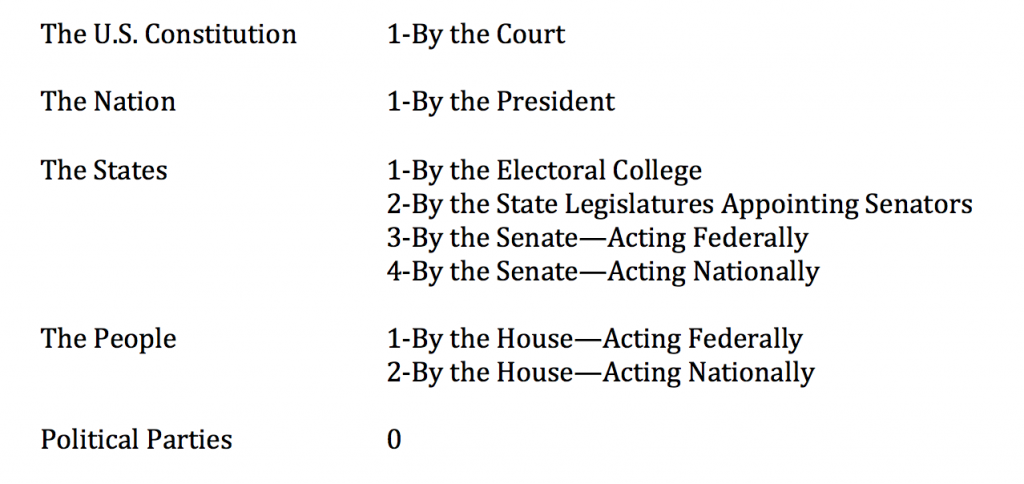
This entire arrangement was carefully thought out by the framers. They knew that the key to lasting freedom was to ensure that the States didn’t lose their power to the federal/national government, so they put in four protections against this (listed above). All were wiped out by the poor decision to adopt the 17th Amendment in 1913. (Ironically, this was ratified during an era of populism.)
Our oversized and overblown national government and corresponding loss of freedoms since that time are the natural result. The best solution would be to repeal the 17th Amendment and restore the proper balance of State and Federal powers.
The following chart shows how the government currently operates. Note that it is very different than the original constitutional arrangement:
THE STRUCTURE TODAY
(Items underlined are changes from the original Constitution
that are destructive to freedom.)
Look at how this has changed our governmental structure of representation:
Did you notice in all this that at the time of the American founding the primary entities of federal/national government were the House and the Senate, while the Court and Presidency were secondary? Compare that to now: the Presidency and Court act like primary branches of government, while the House and Senate act like secondary levels of government.
What the founders called “legislative primacy,” meaning that the people’s elected representatives in Congress had the final say on things through the purse strings, has been replaced by appointed officials in the Court and a huge Executive bureaucracy exerting the final say on most things.
Huge changes. All bad!
For The People
Now, if you’ve followed this article this far, congratulations! Here is the main point, the thesis, the reason for reading this and thinking about it:
Populism is attempting to correct the course of the American ship. Specifically, the populist elections of 2010 and 2014 both attempted to put the House and Senate back on track representing the people—not the political parties.
And the populist uprising of 2016 (among both Democrats and Republicans) is also arguing for the presidency to represent the people again, not the political parties. It’s not as good or as effective as repealing the 17th Amendment—not by a long shot—but at least the electorate is trying.
The voters (some knowingly, and most of them just by following their gut) are attempting to swing things back in the direction of government “by, of, and for” the people—instead of government “by, for, and of” the economic and power elites and their political party establishments.
Populism probably can’t get the ship all the way safely into port, but right now the people are at least trying to get things going in the right direction. If the voters keep at it, and don’t give up—and if they keep winning major elections—this new beginning can eventually be turned in the direction of a real and lasting solution.
Stay tuned…
Category : Aristocracy &Citizenship &Community &Constitution &Culture &Current Events &Economics &Education &Entrepreneurship &Featured &Foreign Affairs &Generations &Government &History &Independents &Information Age &Leadership &Liberty &Politics &Statesmanship


